Contemporary Hospitality Industry Report
VerifiedAdded on 2020/12/29
|9
|2913
|429
Report
AI Summary
This report analyzes the scale, scope, and diversity of the UK hospitality industry, examining its economic impact and the various products and services offered. It also discusses different organizational structures within the sector, using examples of a five-star hotel, catering service, and theme park. The report concludes with an assessment of the role of hospitality-related organizations and professional bodies.
Contribute Materials
Your contribution can guide someone’s learning journey. Share your
documents today.
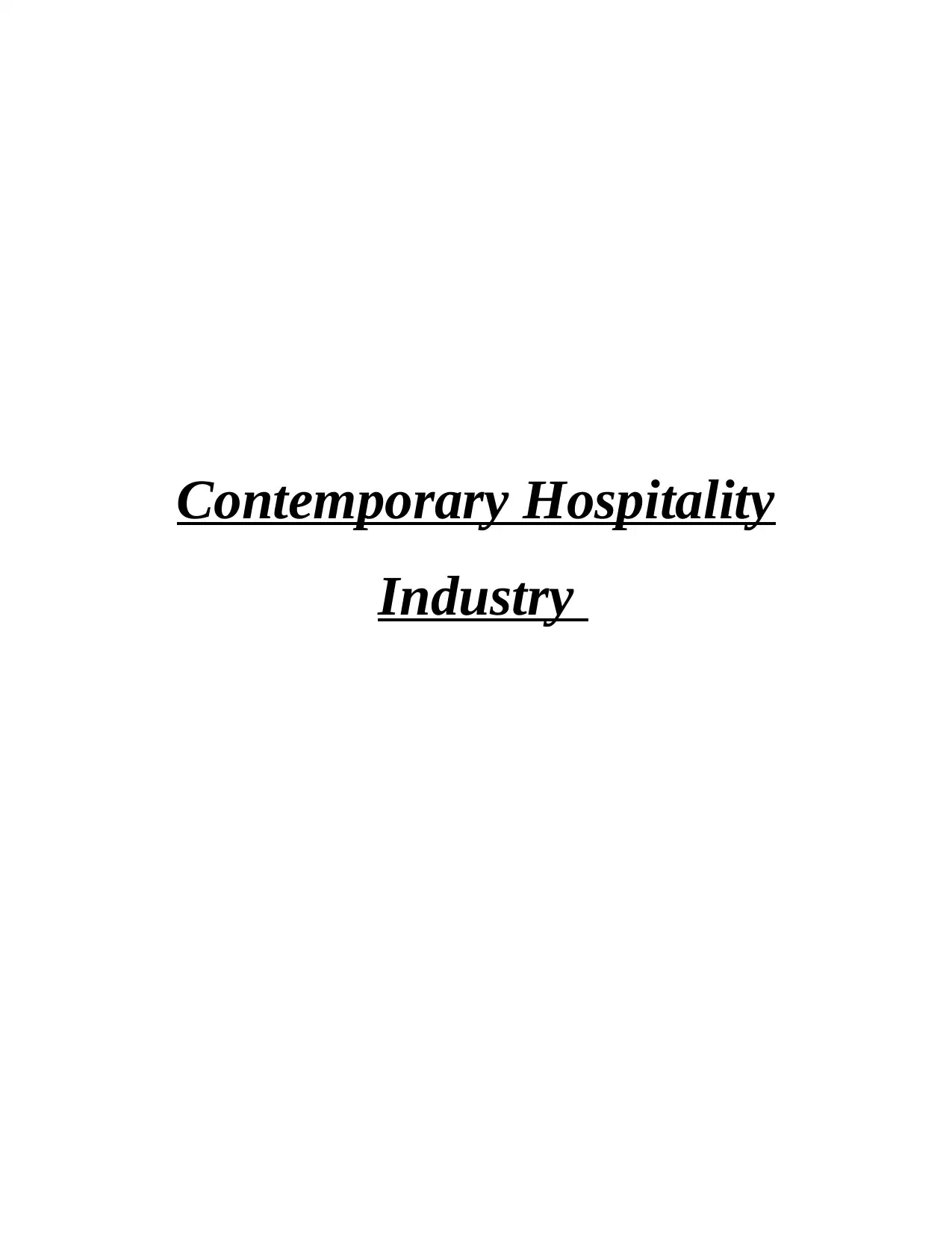
Contemporary Hospitality
Industry
Industry
Secure Best Marks with AI Grader
Need help grading? Try our AI Grader for instant feedback on your assignments.
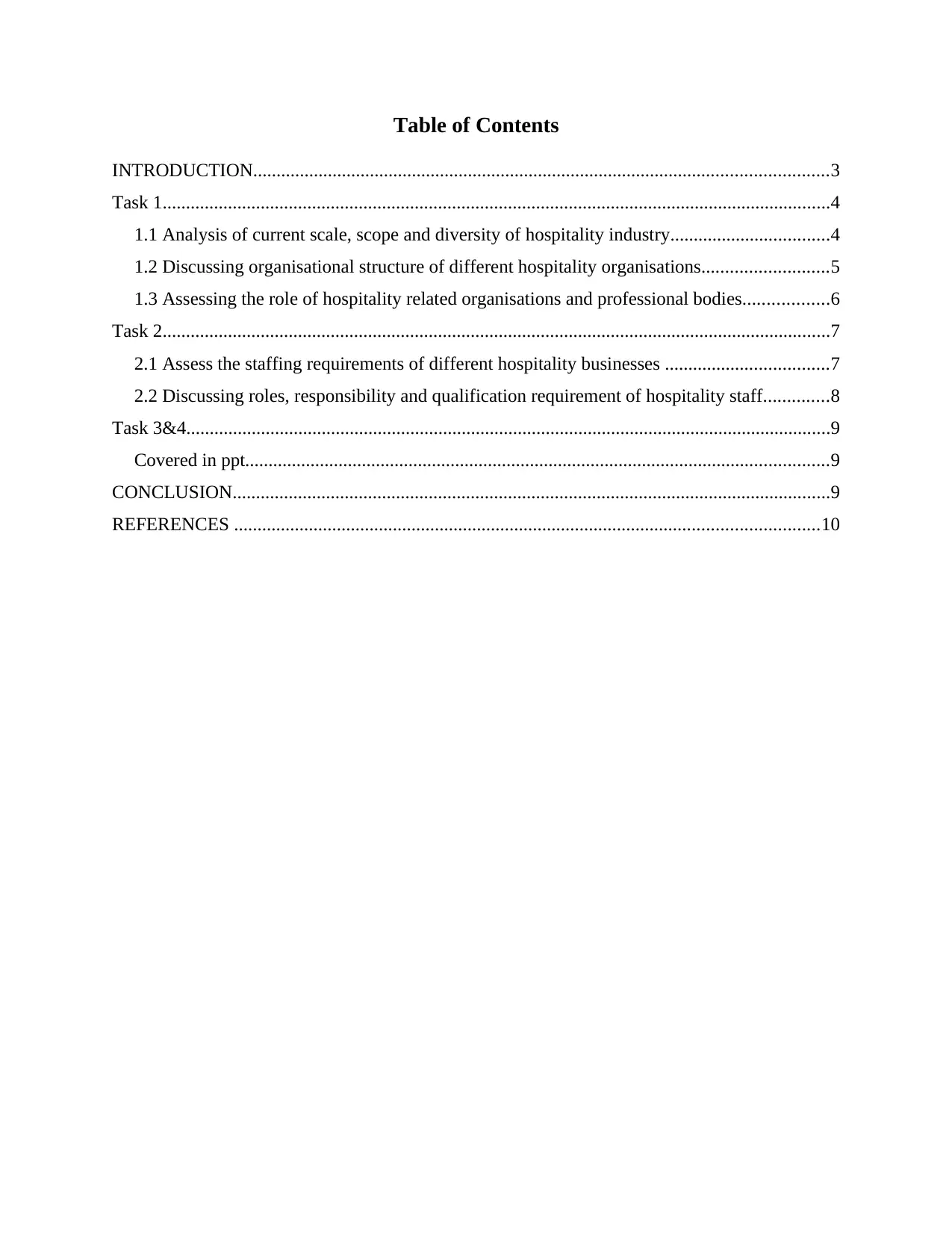
Table of Contents
INTRODUCTION...........................................................................................................................3
Task 1...............................................................................................................................................4
1.1 Analysis of current scale, scope and diversity of hospitality industry..................................4
1.2 Discussing organisational structure of different hospitality organisations...........................5
1.3 Assessing the role of hospitality related organisations and professional bodies..................6
Task 2...............................................................................................................................................7
2.1 Assess the staffing requirements of different hospitality businesses ...................................7
2.2 Discussing roles, responsibility and qualification requirement of hospitality staff..............8
Task 3&4..........................................................................................................................................9
Covered in ppt.............................................................................................................................9
CONCLUSION................................................................................................................................9
REFERENCES .............................................................................................................................10
INTRODUCTION...........................................................................................................................3
Task 1...............................................................................................................................................4
1.1 Analysis of current scale, scope and diversity of hospitality industry..................................4
1.2 Discussing organisational structure of different hospitality organisations...........................5
1.3 Assessing the role of hospitality related organisations and professional bodies..................6
Task 2...............................................................................................................................................7
2.1 Assess the staffing requirements of different hospitality businesses ...................................7
2.2 Discussing roles, responsibility and qualification requirement of hospitality staff..............8
Task 3&4..........................................................................................................................................9
Covered in ppt.............................................................................................................................9
CONCLUSION................................................................................................................................9
REFERENCES .............................................................................................................................10
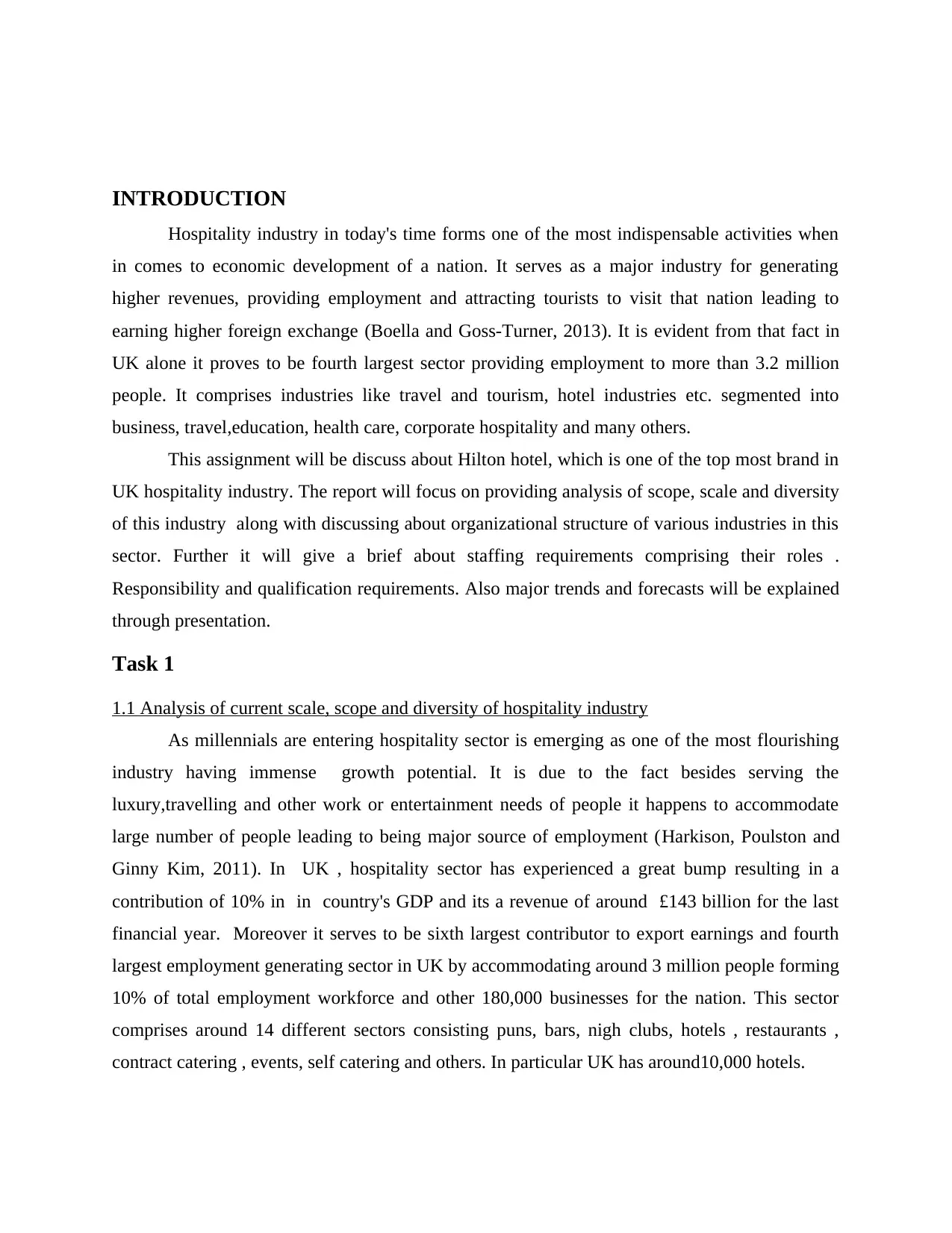
INTRODUCTION
Hospitality industry in today's time forms one of the most indispensable activities when
in comes to economic development of a nation. It serves as a major industry for generating
higher revenues, providing employment and attracting tourists to visit that nation leading to
earning higher foreign exchange (Boella and Goss-Turner, 2013). It is evident from that fact in
UK alone it proves to be fourth largest sector providing employment to more than 3.2 million
people. It comprises industries like travel and tourism, hotel industries etc. segmented into
business, travel,education, health care, corporate hospitality and many others.
This assignment will be discuss about Hilton hotel, which is one of the top most brand in
UK hospitality industry. The report will focus on providing analysis of scope, scale and diversity
of this industry along with discussing about organizational structure of various industries in this
sector. Further it will give a brief about staffing requirements comprising their roles .
Responsibility and qualification requirements. Also major trends and forecasts will be explained
through presentation.
Task 1
1.1 Analysis of current scale, scope and diversity of hospitality industry
As millennials are entering hospitality sector is emerging as one of the most flourishing
industry having immense growth potential. It is due to the fact besides serving the
luxury,travelling and other work or entertainment needs of people it happens to accommodate
large number of people leading to being major source of employment (Harkison, Poulston and
Ginny Kim, 2011). In UK , hospitality sector has experienced a great bump resulting in a
contribution of 10% in in country's GDP and its a revenue of around £143 billion for the last
financial year. Moreover it serves to be sixth largest contributor to export earnings and fourth
largest employment generating sector in UK by accommodating around 3 million people forming
10% of total employment workforce and other 180,000 businesses for the nation. This sector
comprises around 14 different sectors consisting puns, bars, nigh clubs, hotels , restaurants ,
contract catering , events, self catering and others. In particular UK has around10,000 hotels.
Hospitality industry in today's time forms one of the most indispensable activities when
in comes to economic development of a nation. It serves as a major industry for generating
higher revenues, providing employment and attracting tourists to visit that nation leading to
earning higher foreign exchange (Boella and Goss-Turner, 2013). It is evident from that fact in
UK alone it proves to be fourth largest sector providing employment to more than 3.2 million
people. It comprises industries like travel and tourism, hotel industries etc. segmented into
business, travel,education, health care, corporate hospitality and many others.
This assignment will be discuss about Hilton hotel, which is one of the top most brand in
UK hospitality industry. The report will focus on providing analysis of scope, scale and diversity
of this industry along with discussing about organizational structure of various industries in this
sector. Further it will give a brief about staffing requirements comprising their roles .
Responsibility and qualification requirements. Also major trends and forecasts will be explained
through presentation.
Task 1
1.1 Analysis of current scale, scope and diversity of hospitality industry
As millennials are entering hospitality sector is emerging as one of the most flourishing
industry having immense growth potential. It is due to the fact besides serving the
luxury,travelling and other work or entertainment needs of people it happens to accommodate
large number of people leading to being major source of employment (Harkison, Poulston and
Ginny Kim, 2011). In UK , hospitality sector has experienced a great bump resulting in a
contribution of 10% in in country's GDP and its a revenue of around £143 billion for the last
financial year. Moreover it serves to be sixth largest contributor to export earnings and fourth
largest employment generating sector in UK by accommodating around 3 million people forming
10% of total employment workforce and other 180,000 businesses for the nation. This sector
comprises around 14 different sectors consisting puns, bars, nigh clubs, hotels , restaurants ,
contract catering , events, self catering and others. In particular UK has around10,000 hotels.
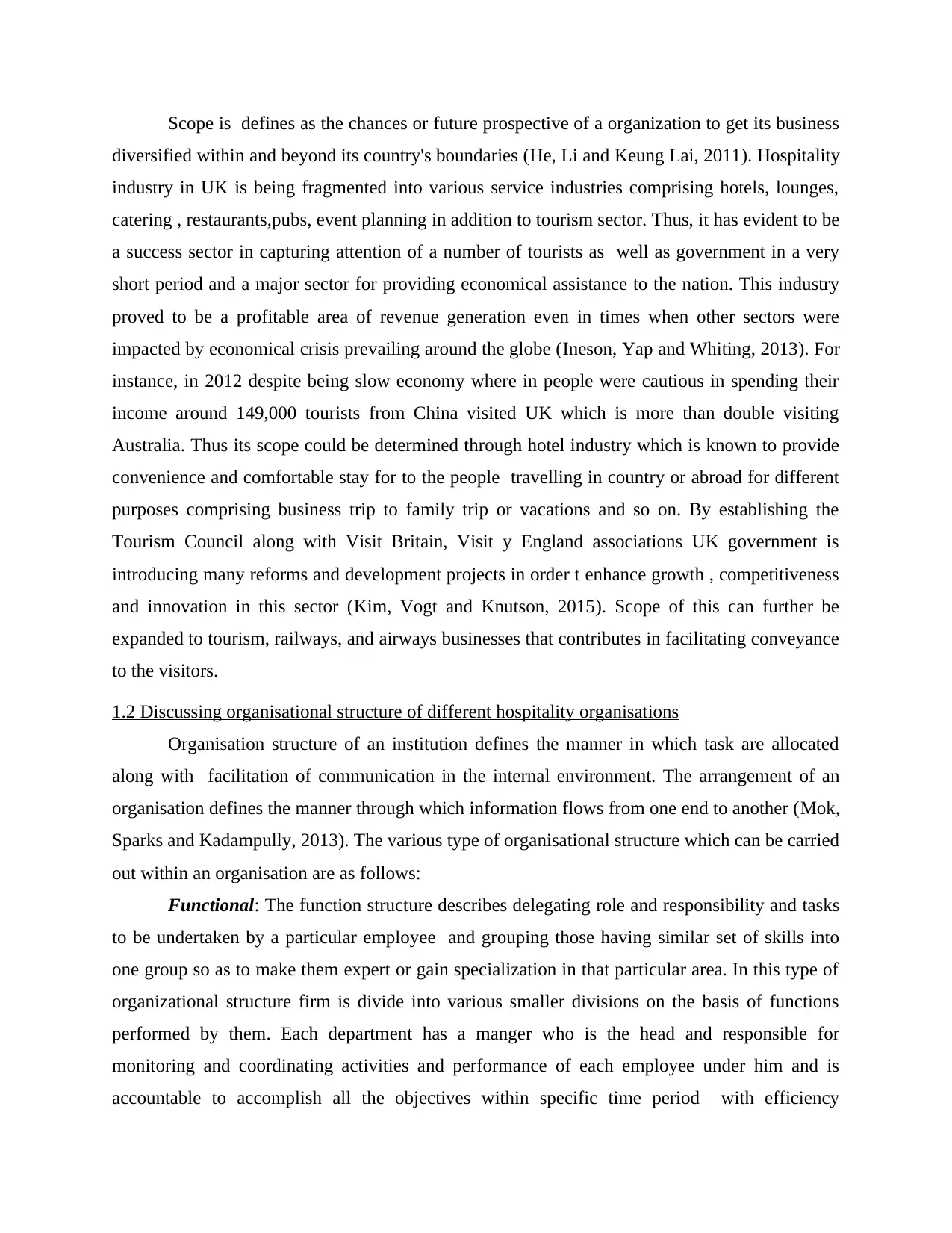
Scope is defines as the chances or future prospective of a organization to get its business
diversified within and beyond its country's boundaries (He, Li and Keung Lai, 2011). Hospitality
industry in UK is being fragmented into various service industries comprising hotels, lounges,
catering , restaurants,pubs, event planning in addition to tourism sector. Thus, it has evident to be
a success sector in capturing attention of a number of tourists as well as government in a very
short period and a major sector for providing economical assistance to the nation. This industry
proved to be a profitable area of revenue generation even in times when other sectors were
impacted by economical crisis prevailing around the globe (Ineson, Yap and Whiting, 2013). For
instance, in 2012 despite being slow economy where in people were cautious in spending their
income around 149,000 tourists from China visited UK which is more than double visiting
Australia. Thus its scope could be determined through hotel industry which is known to provide
convenience and comfortable stay for to the people travelling in country or abroad for different
purposes comprising business trip to family trip or vacations and so on. By establishing the
Tourism Council along with Visit Britain, Visit y England associations UK government is
introducing many reforms and development projects in order t enhance growth , competitiveness
and innovation in this sector (Kim, Vogt and Knutson, 2015). Scope of this can further be
expanded to tourism, railways, and airways businesses that contributes in facilitating conveyance
to the visitors.
1.2 Discussing organisational structure of different hospitality organisations
Organisation structure of an institution defines the manner in which task are allocated
along with facilitation of communication in the internal environment. The arrangement of an
organisation defines the manner through which information flows from one end to another (Mok,
Sparks and Kadampully, 2013). The various type of organisational structure which can be carried
out within an organisation are as follows:
Functional: The function structure describes delegating role and responsibility and tasks
to be undertaken by a particular employee and grouping those having similar set of skills into
one group so as to make them expert or gain specialization in that particular area. In this type of
organizational structure firm is divide into various smaller divisions on the basis of functions
performed by them. Each department has a manger who is the head and responsible for
monitoring and coordinating activities and performance of each employee under him and is
accountable to accomplish all the objectives within specific time period with efficiency
diversified within and beyond its country's boundaries (He, Li and Keung Lai, 2011). Hospitality
industry in UK is being fragmented into various service industries comprising hotels, lounges,
catering , restaurants,pubs, event planning in addition to tourism sector. Thus, it has evident to be
a success sector in capturing attention of a number of tourists as well as government in a very
short period and a major sector for providing economical assistance to the nation. This industry
proved to be a profitable area of revenue generation even in times when other sectors were
impacted by economical crisis prevailing around the globe (Ineson, Yap and Whiting, 2013). For
instance, in 2012 despite being slow economy where in people were cautious in spending their
income around 149,000 tourists from China visited UK which is more than double visiting
Australia. Thus its scope could be determined through hotel industry which is known to provide
convenience and comfortable stay for to the people travelling in country or abroad for different
purposes comprising business trip to family trip or vacations and so on. By establishing the
Tourism Council along with Visit Britain, Visit y England associations UK government is
introducing many reforms and development projects in order t enhance growth , competitiveness
and innovation in this sector (Kim, Vogt and Knutson, 2015). Scope of this can further be
expanded to tourism, railways, and airways businesses that contributes in facilitating conveyance
to the visitors.
1.2 Discussing organisational structure of different hospitality organisations
Organisation structure of an institution defines the manner in which task are allocated
along with facilitation of communication in the internal environment. The arrangement of an
organisation defines the manner through which information flows from one end to another (Mok,
Sparks and Kadampully, 2013). The various type of organisational structure which can be carried
out within an organisation are as follows:
Functional: The function structure describes delegating role and responsibility and tasks
to be undertaken by a particular employee and grouping those having similar set of skills into
one group so as to make them expert or gain specialization in that particular area. In this type of
organizational structure firm is divide into various smaller divisions on the basis of functions
performed by them. Each department has a manger who is the head and responsible for
monitoring and coordinating activities and performance of each employee under him and is
accountable to accomplish all the objectives within specific time period with efficiency
Secure Best Marks with AI Grader
Need help grading? Try our AI Grader for instant feedback on your assignments.
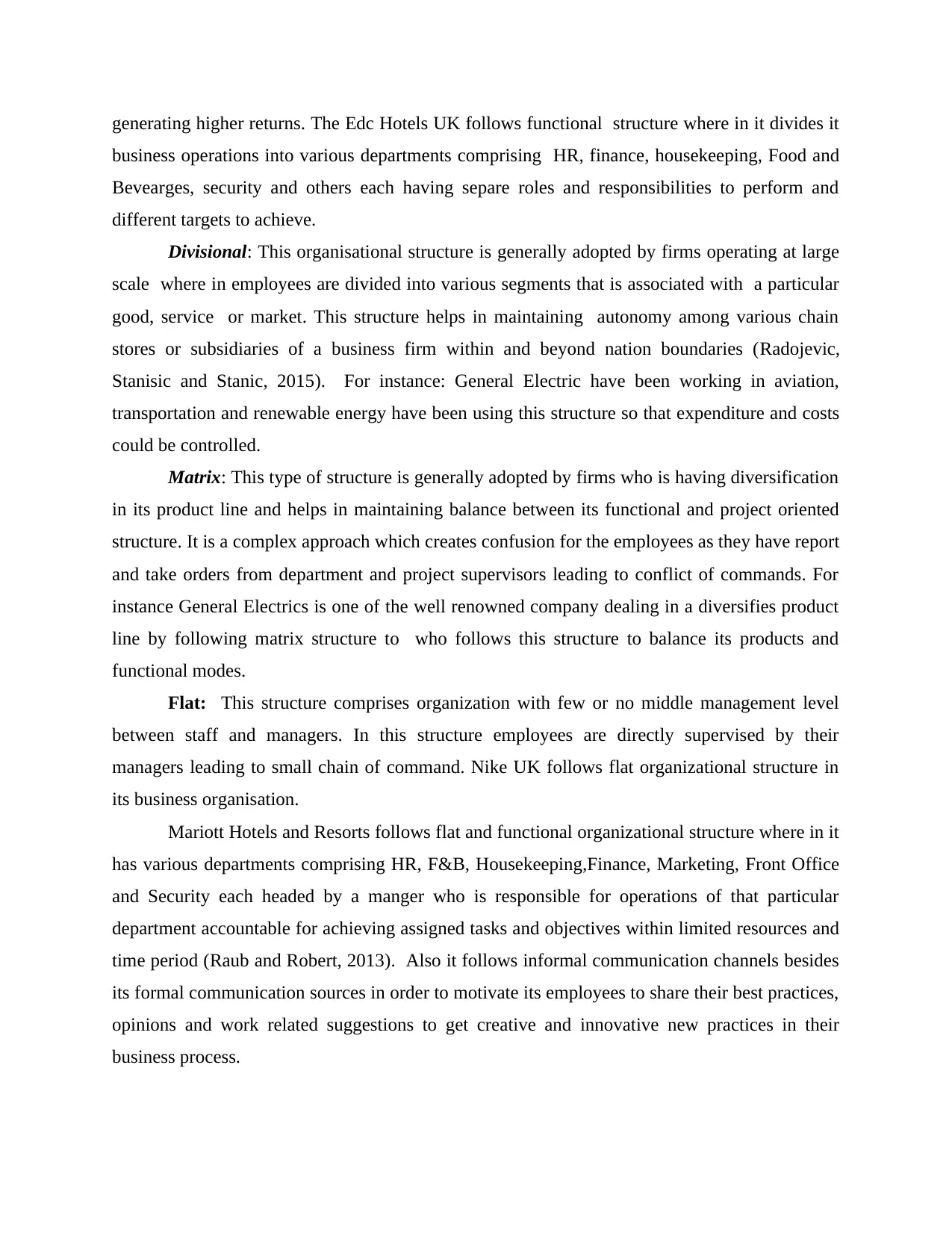
generating higher returns. The Edc Hotels UK follows functional structure where in it divides it
business operations into various departments comprising HR, finance, housekeeping, Food and
Bevearges, security and others each having separe roles and responsibilities to perform and
different targets to achieve.
Divisional: This organisational structure is generally adopted by firms operating at large
scale where in employees are divided into various segments that is associated with a particular
good, service or market. This structure helps in maintaining autonomy among various chain
stores or subsidiaries of a business firm within and beyond nation boundaries (Radojevic,
Stanisic and Stanic, 2015). For instance: General Electric have been working in aviation,
transportation and renewable energy have been using this structure so that expenditure and costs
could be controlled.
Matrix: This type of structure is generally adopted by firms who is having diversification
in its product line and helps in maintaining balance between its functional and project oriented
structure. It is a complex approach which creates confusion for the employees as they have report
and take orders from department and project supervisors leading to conflict of commands. For
instance General Electrics is one of the well renowned company dealing in a diversifies product
line by following matrix structure to who follows this structure to balance its products and
functional modes.
Flat: This structure comprises organization with few or no middle management level
between staff and managers. In this structure employees are directly supervised by their
managers leading to small chain of command. Nike UK follows flat organizational structure in
its business organisation.
Mariott Hotels and Resorts follows flat and functional organizational structure where in it
has various departments comprising HR, F&B, Housekeeping,Finance, Marketing, Front Office
and Security each headed by a manger who is responsible for operations of that particular
department accountable for achieving assigned tasks and objectives within limited resources and
time period (Raub and Robert, 2013). Also it follows informal communication channels besides
its formal communication sources in order to motivate its employees to share their best practices,
opinions and work related suggestions to get creative and innovative new practices in their
business process.
business operations into various departments comprising HR, finance, housekeeping, Food and
Bevearges, security and others each having separe roles and responsibilities to perform and
different targets to achieve.
Divisional: This organisational structure is generally adopted by firms operating at large
scale where in employees are divided into various segments that is associated with a particular
good, service or market. This structure helps in maintaining autonomy among various chain
stores or subsidiaries of a business firm within and beyond nation boundaries (Radojevic,
Stanisic and Stanic, 2015). For instance: General Electric have been working in aviation,
transportation and renewable energy have been using this structure so that expenditure and costs
could be controlled.
Matrix: This type of structure is generally adopted by firms who is having diversification
in its product line and helps in maintaining balance between its functional and project oriented
structure. It is a complex approach which creates confusion for the employees as they have report
and take orders from department and project supervisors leading to conflict of commands. For
instance General Electrics is one of the well renowned company dealing in a diversifies product
line by following matrix structure to who follows this structure to balance its products and
functional modes.
Flat: This structure comprises organization with few or no middle management level
between staff and managers. In this structure employees are directly supervised by their
managers leading to small chain of command. Nike UK follows flat organizational structure in
its business organisation.
Mariott Hotels and Resorts follows flat and functional organizational structure where in it
has various departments comprising HR, F&B, Housekeeping,Finance, Marketing, Front Office
and Security each headed by a manger who is responsible for operations of that particular
department accountable for achieving assigned tasks and objectives within limited resources and
time period (Raub and Robert, 2013). Also it follows informal communication channels besides
its formal communication sources in order to motivate its employees to share their best practices,
opinions and work related suggestions to get creative and innovative new practices in their
business process.
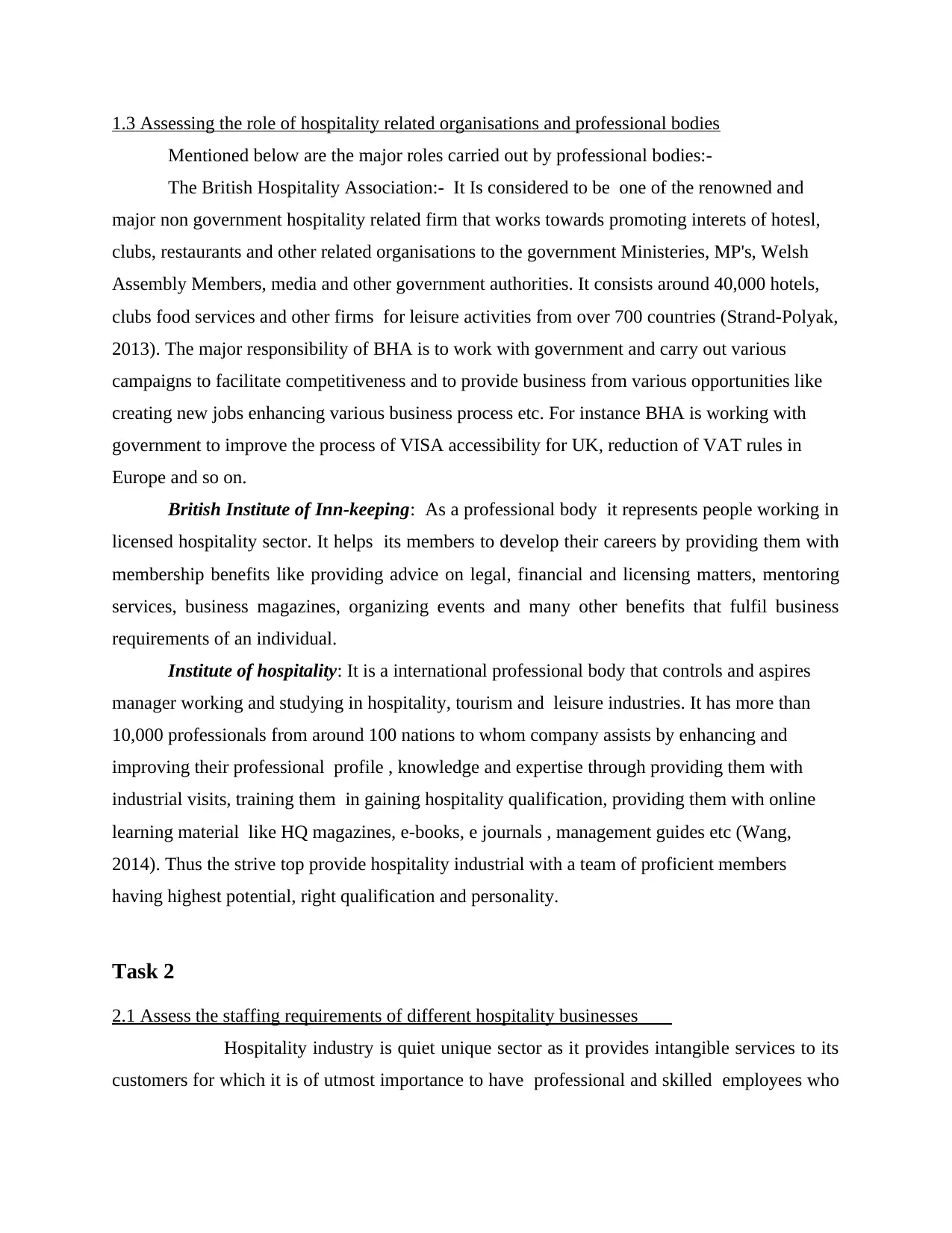
1.3 Assessing the role of hospitality related organisations and professional bodies
Mentioned below are the major roles carried out by professional bodies:-
The British Hospitality Association:- It Is considered to be one of the renowned and
major non government hospitality related firm that works towards promoting interets of hotesl,
clubs, restaurants and other related organisations to the government Ministeries, MP's, Welsh
Assembly Members, media and other government authorities. It consists around 40,000 hotels,
clubs food services and other firms for leisure activities from over 700 countries (Strand-Polyak,
2013). The major responsibility of BHA is to work with government and carry out various
campaigns to facilitate competitiveness and to provide business from various opportunities like
creating new jobs enhancing various business process etc. For instance BHA is working with
government to improve the process of VISA accessibility for UK, reduction of VAT rules in
Europe and so on.
British Institute of Inn-keeping: As a professional body it represents people working in
licensed hospitality sector. It helps its members to develop their careers by providing them with
membership benefits like providing advice on legal, financial and licensing matters, mentoring
services, business magazines, organizing events and many other benefits that fulfil business
requirements of an individual.
Institute of hospitality: It is a international professional body that controls and aspires
manager working and studying in hospitality, tourism and leisure industries. It has more than
10,000 professionals from around 100 nations to whom company assists by enhancing and
improving their professional profile , knowledge and expertise through providing them with
industrial visits, training them in gaining hospitality qualification, providing them with online
learning material like HQ magazines, e-books, e journals , management guides etc (Wang,
2014). Thus the strive top provide hospitality industrial with a team of proficient members
having highest potential, right qualification and personality.
Task 2
2.1 Assess the staffing requirements of different hospitality businesses
Hospitality industry is quiet unique sector as it provides intangible services to its
customers for which it is of utmost importance to have professional and skilled employees who
Mentioned below are the major roles carried out by professional bodies:-
The British Hospitality Association:- It Is considered to be one of the renowned and
major non government hospitality related firm that works towards promoting interets of hotesl,
clubs, restaurants and other related organisations to the government Ministeries, MP's, Welsh
Assembly Members, media and other government authorities. It consists around 40,000 hotels,
clubs food services and other firms for leisure activities from over 700 countries (Strand-Polyak,
2013). The major responsibility of BHA is to work with government and carry out various
campaigns to facilitate competitiveness and to provide business from various opportunities like
creating new jobs enhancing various business process etc. For instance BHA is working with
government to improve the process of VISA accessibility for UK, reduction of VAT rules in
Europe and so on.
British Institute of Inn-keeping: As a professional body it represents people working in
licensed hospitality sector. It helps its members to develop their careers by providing them with
membership benefits like providing advice on legal, financial and licensing matters, mentoring
services, business magazines, organizing events and many other benefits that fulfil business
requirements of an individual.
Institute of hospitality: It is a international professional body that controls and aspires
manager working and studying in hospitality, tourism and leisure industries. It has more than
10,000 professionals from around 100 nations to whom company assists by enhancing and
improving their professional profile , knowledge and expertise through providing them with
industrial visits, training them in gaining hospitality qualification, providing them with online
learning material like HQ magazines, e-books, e journals , management guides etc (Wang,
2014). Thus the strive top provide hospitality industrial with a team of proficient members
having highest potential, right qualification and personality.
Task 2
2.1 Assess the staffing requirements of different hospitality businesses
Hospitality industry is quiet unique sector as it provides intangible services to its
customers for which it is of utmost importance to have professional and skilled employees who
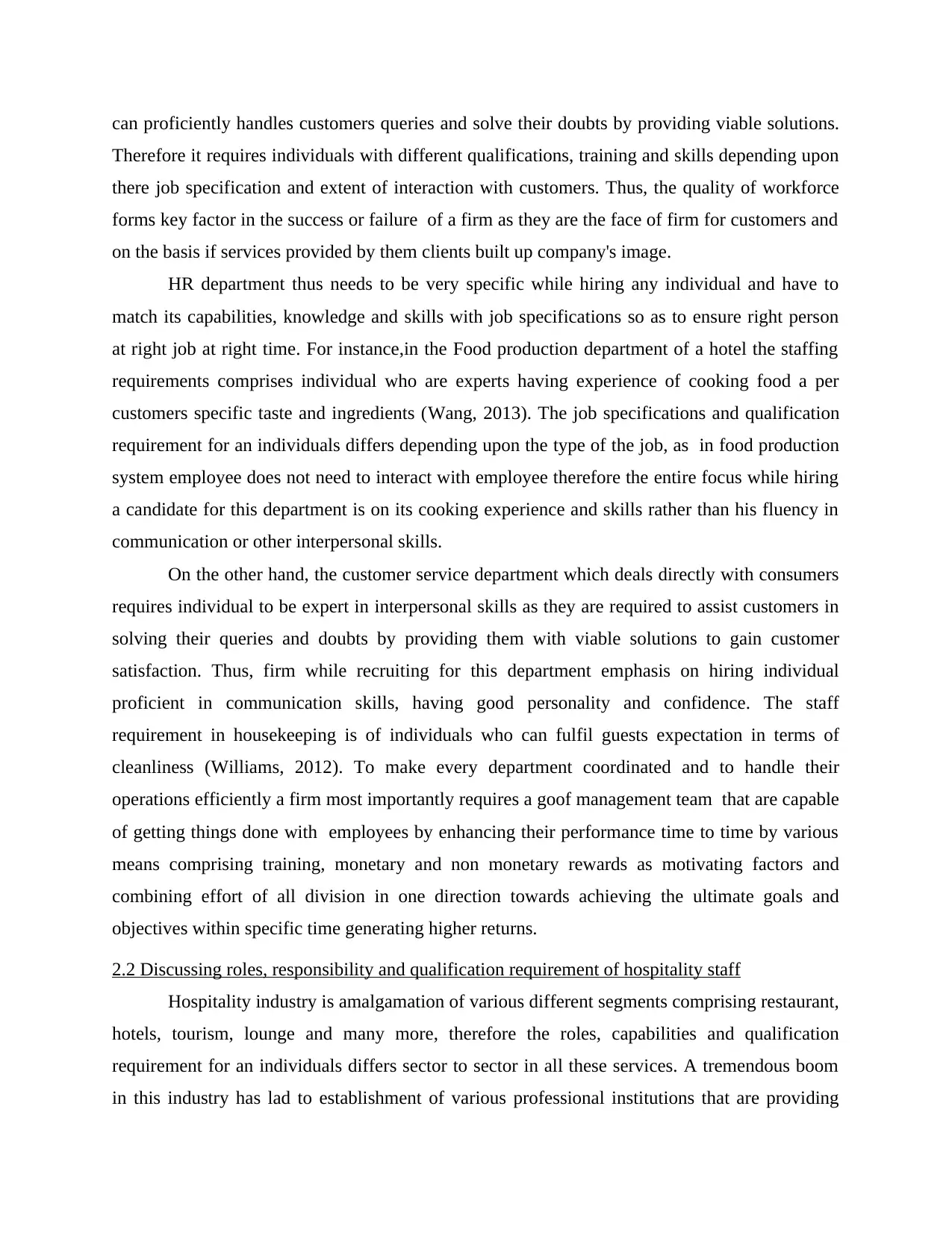
can proficiently handles customers queries and solve their doubts by providing viable solutions.
Therefore it requires individuals with different qualifications, training and skills depending upon
there job specification and extent of interaction with customers. Thus, the quality of workforce
forms key factor in the success or failure of a firm as they are the face of firm for customers and
on the basis if services provided by them clients built up company's image.
HR department thus needs to be very specific while hiring any individual and have to
match its capabilities, knowledge and skills with job specifications so as to ensure right person
at right job at right time. For instance,in the Food production department of a hotel the staffing
requirements comprises individual who are experts having experience of cooking food a per
customers specific taste and ingredients (Wang, 2013). The job specifications and qualification
requirement for an individuals differs depending upon the type of the job, as in food production
system employee does not need to interact with employee therefore the entire focus while hiring
a candidate for this department is on its cooking experience and skills rather than his fluency in
communication or other interpersonal skills.
On the other hand, the customer service department which deals directly with consumers
requires individual to be expert in interpersonal skills as they are required to assist customers in
solving their queries and doubts by providing them with viable solutions to gain customer
satisfaction. Thus, firm while recruiting for this department emphasis on hiring individual
proficient in communication skills, having good personality and confidence. The staff
requirement in housekeeping is of individuals who can fulfil guests expectation in terms of
cleanliness (Williams, 2012). To make every department coordinated and to handle their
operations efficiently a firm most importantly requires a goof management team that are capable
of getting things done with employees by enhancing their performance time to time by various
means comprising training, monetary and non monetary rewards as motivating factors and
combining effort of all division in one direction towards achieving the ultimate goals and
objectives within specific time generating higher returns.
2.2 Discussing roles, responsibility and qualification requirement of hospitality staff
Hospitality industry is amalgamation of various different segments comprising restaurant,
hotels, tourism, lounge and many more, therefore the roles, capabilities and qualification
requirement for an individuals differs sector to sector in all these services. A tremendous boom
in this industry has lad to establishment of various professional institutions that are providing
Therefore it requires individuals with different qualifications, training and skills depending upon
there job specification and extent of interaction with customers. Thus, the quality of workforce
forms key factor in the success or failure of a firm as they are the face of firm for customers and
on the basis if services provided by them clients built up company's image.
HR department thus needs to be very specific while hiring any individual and have to
match its capabilities, knowledge and skills with job specifications so as to ensure right person
at right job at right time. For instance,in the Food production department of a hotel the staffing
requirements comprises individual who are experts having experience of cooking food a per
customers specific taste and ingredients (Wang, 2013). The job specifications and qualification
requirement for an individuals differs depending upon the type of the job, as in food production
system employee does not need to interact with employee therefore the entire focus while hiring
a candidate for this department is on its cooking experience and skills rather than his fluency in
communication or other interpersonal skills.
On the other hand, the customer service department which deals directly with consumers
requires individual to be expert in interpersonal skills as they are required to assist customers in
solving their queries and doubts by providing them with viable solutions to gain customer
satisfaction. Thus, firm while recruiting for this department emphasis on hiring individual
proficient in communication skills, having good personality and confidence. The staff
requirement in housekeeping is of individuals who can fulfil guests expectation in terms of
cleanliness (Williams, 2012). To make every department coordinated and to handle their
operations efficiently a firm most importantly requires a goof management team that are capable
of getting things done with employees by enhancing their performance time to time by various
means comprising training, monetary and non monetary rewards as motivating factors and
combining effort of all division in one direction towards achieving the ultimate goals and
objectives within specific time generating higher returns.
2.2 Discussing roles, responsibility and qualification requirement of hospitality staff
Hospitality industry is amalgamation of various different segments comprising restaurant,
hotels, tourism, lounge and many more, therefore the roles, capabilities and qualification
requirement for an individuals differs sector to sector in all these services. A tremendous boom
in this industry has lad to establishment of various professional institutions that are providing
Paraphrase This Document
Need a fresh take? Get an instant paraphrase of this document with our AI Paraphraser
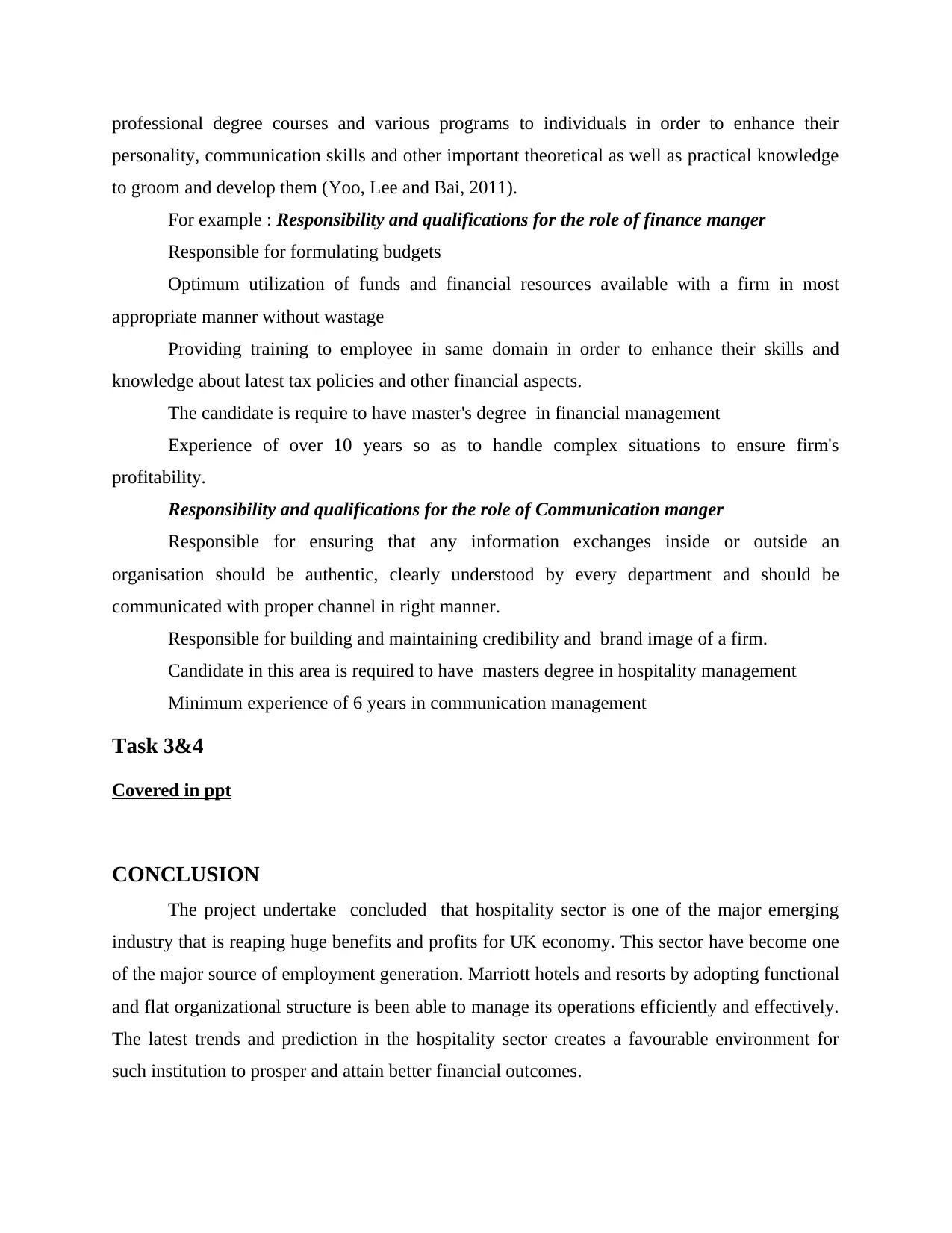
professional degree courses and various programs to individuals in order to enhance their
personality, communication skills and other important theoretical as well as practical knowledge
to groom and develop them (Yoo, Lee and Bai, 2011).
For example : Responsibility and qualifications for the role of finance manger
Responsible for formulating budgets
Optimum utilization of funds and financial resources available with a firm in most
appropriate manner without wastage
Providing training to employee in same domain in order to enhance their skills and
knowledge about latest tax policies and other financial aspects.
The candidate is require to have master's degree in financial management
Experience of over 10 years so as to handle complex situations to ensure firm's
profitability.
Responsibility and qualifications for the role of Communication manger
Responsible for ensuring that any information exchanges inside or outside an
organisation should be authentic, clearly understood by every department and should be
communicated with proper channel in right manner.
Responsible for building and maintaining credibility and brand image of a firm.
Candidate in this area is required to have masters degree in hospitality management
Minimum experience of 6 years in communication management
Task 3&4
Covered in ppt
CONCLUSION
The project undertake concluded that hospitality sector is one of the major emerging
industry that is reaping huge benefits and profits for UK economy. This sector have become one
of the major source of employment generation. Marriott hotels and resorts by adopting functional
and flat organizational structure is been able to manage its operations efficiently and effectively.
The latest trends and prediction in the hospitality sector creates a favourable environment for
such institution to prosper and attain better financial outcomes.
personality, communication skills and other important theoretical as well as practical knowledge
to groom and develop them (Yoo, Lee and Bai, 2011).
For example : Responsibility and qualifications for the role of finance manger
Responsible for formulating budgets
Optimum utilization of funds and financial resources available with a firm in most
appropriate manner without wastage
Providing training to employee in same domain in order to enhance their skills and
knowledge about latest tax policies and other financial aspects.
The candidate is require to have master's degree in financial management
Experience of over 10 years so as to handle complex situations to ensure firm's
profitability.
Responsibility and qualifications for the role of Communication manger
Responsible for ensuring that any information exchanges inside or outside an
organisation should be authentic, clearly understood by every department and should be
communicated with proper channel in right manner.
Responsible for building and maintaining credibility and brand image of a firm.
Candidate in this area is required to have masters degree in hospitality management
Minimum experience of 6 years in communication management
Task 3&4
Covered in ppt
CONCLUSION
The project undertake concluded that hospitality sector is one of the major emerging
industry that is reaping huge benefits and profits for UK economy. This sector have become one
of the major source of employment generation. Marriott hotels and resorts by adopting functional
and flat organizational structure is been able to manage its operations efficiently and effectively.
The latest trends and prediction in the hospitality sector creates a favourable environment for
such institution to prosper and attain better financial outcomes.
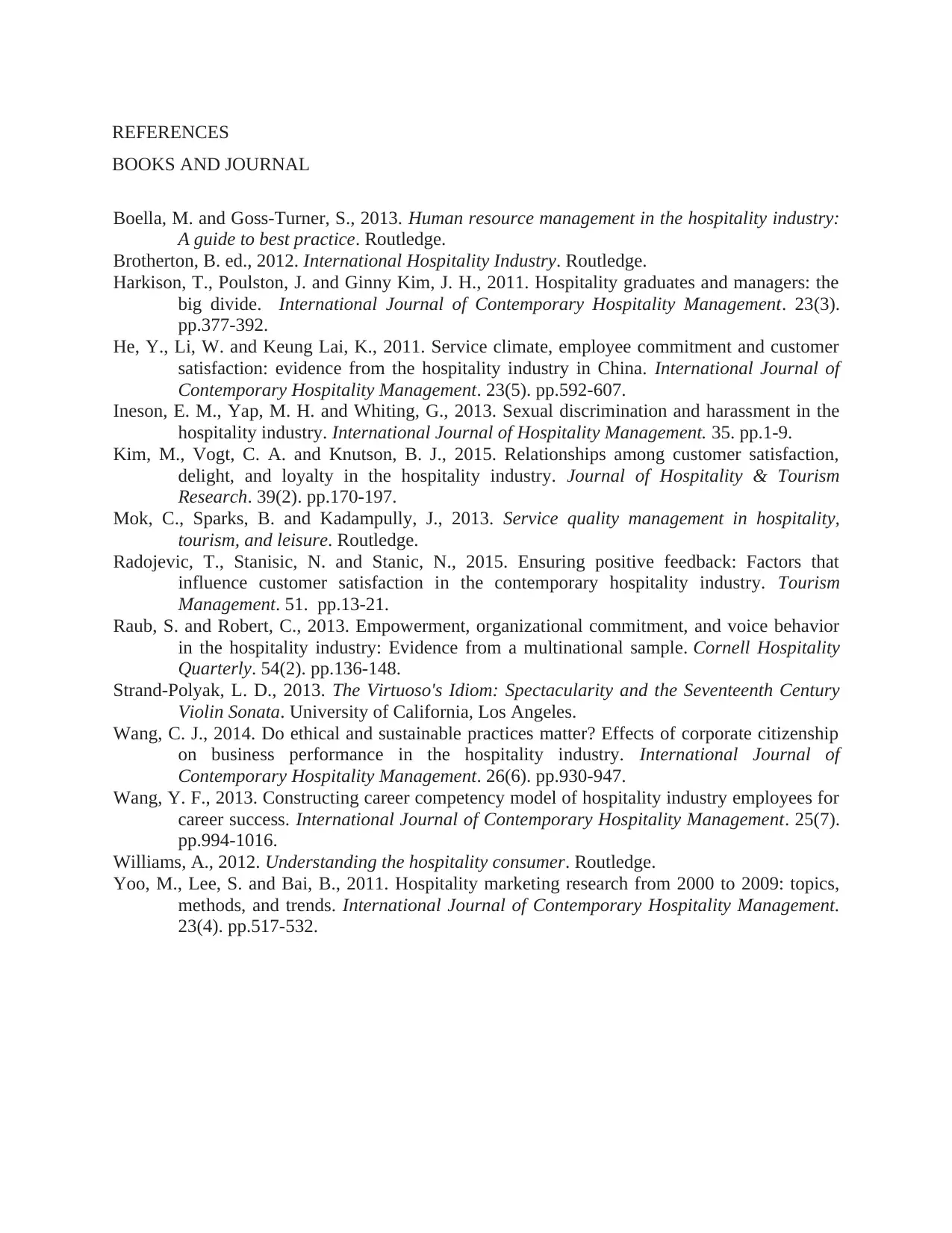
REFERENCES
BOOKS AND JOURNAL
Boella, M. and Goss-Turner, S., 2013. Human resource management in the hospitality industry:
A guide to best practice. Routledge.
Brotherton, B. ed., 2012. International Hospitality Industry. Routledge.
Harkison, T., Poulston, J. and Ginny Kim, J. H., 2011. Hospitality graduates and managers: the
big divide. International Journal of Contemporary Hospitality Management. 23(3).
pp.377-392.
He, Y., Li, W. and Keung Lai, K., 2011. Service climate, employee commitment and customer
satisfaction: evidence from the hospitality industry in China. International Journal of
Contemporary Hospitality Management. 23(5). pp.592-607.
Ineson, E. M., Yap, M. H. and Whiting, G., 2013. Sexual discrimination and harassment in the
hospitality industry. International Journal of Hospitality Management. 35. pp.1-9.
Kim, M., Vogt, C. A. and Knutson, B. J., 2015. Relationships among customer satisfaction,
delight, and loyalty in the hospitality industry. Journal of Hospitality & Tourism
Research. 39(2). pp.170-197.
Mok, C., Sparks, B. and Kadampully, J., 2013. Service quality management in hospitality,
tourism, and leisure. Routledge.
Radojevic, T., Stanisic, N. and Stanic, N., 2015. Ensuring positive feedback: Factors that
influence customer satisfaction in the contemporary hospitality industry. Tourism
Management. 51. pp.13-21.
Raub, S. and Robert, C., 2013. Empowerment, organizational commitment, and voice behavior
in the hospitality industry: Evidence from a multinational sample. Cornell Hospitality
Quarterly. 54(2). pp.136-148.
Strand-Polyak, L. D., 2013. The Virtuoso's Idiom: Spectacularity and the Seventeenth Century
Violin Sonata. University of California, Los Angeles.
Wang, C. J., 2014. Do ethical and sustainable practices matter? Effects of corporate citizenship
on business performance in the hospitality industry. International Journal of
Contemporary Hospitality Management. 26(6). pp.930-947.
Wang, Y. F., 2013. Constructing career competency model of hospitality industry employees for
career success. International Journal of Contemporary Hospitality Management. 25(7).
pp.994-1016.
Williams, A., 2012. Understanding the hospitality consumer. Routledge.
Yoo, M., Lee, S. and Bai, B., 2011. Hospitality marketing research from 2000 to 2009: topics,
methods, and trends. International Journal of Contemporary Hospitality Management.
23(4). pp.517-532.
BOOKS AND JOURNAL
Boella, M. and Goss-Turner, S., 2013. Human resource management in the hospitality industry:
A guide to best practice. Routledge.
Brotherton, B. ed., 2012. International Hospitality Industry. Routledge.
Harkison, T., Poulston, J. and Ginny Kim, J. H., 2011. Hospitality graduates and managers: the
big divide. International Journal of Contemporary Hospitality Management. 23(3).
pp.377-392.
He, Y., Li, W. and Keung Lai, K., 2011. Service climate, employee commitment and customer
satisfaction: evidence from the hospitality industry in China. International Journal of
Contemporary Hospitality Management. 23(5). pp.592-607.
Ineson, E. M., Yap, M. H. and Whiting, G., 2013. Sexual discrimination and harassment in the
hospitality industry. International Journal of Hospitality Management. 35. pp.1-9.
Kim, M., Vogt, C. A. and Knutson, B. J., 2015. Relationships among customer satisfaction,
delight, and loyalty in the hospitality industry. Journal of Hospitality & Tourism
Research. 39(2). pp.170-197.
Mok, C., Sparks, B. and Kadampully, J., 2013. Service quality management in hospitality,
tourism, and leisure. Routledge.
Radojevic, T., Stanisic, N. and Stanic, N., 2015. Ensuring positive feedback: Factors that
influence customer satisfaction in the contemporary hospitality industry. Tourism
Management. 51. pp.13-21.
Raub, S. and Robert, C., 2013. Empowerment, organizational commitment, and voice behavior
in the hospitality industry: Evidence from a multinational sample. Cornell Hospitality
Quarterly. 54(2). pp.136-148.
Strand-Polyak, L. D., 2013. The Virtuoso's Idiom: Spectacularity and the Seventeenth Century
Violin Sonata. University of California, Los Angeles.
Wang, C. J., 2014. Do ethical and sustainable practices matter? Effects of corporate citizenship
on business performance in the hospitality industry. International Journal of
Contemporary Hospitality Management. 26(6). pp.930-947.
Wang, Y. F., 2013. Constructing career competency model of hospitality industry employees for
career success. International Journal of Contemporary Hospitality Management. 25(7).
pp.994-1016.
Williams, A., 2012. Understanding the hospitality consumer. Routledge.
Yoo, M., Lee, S. and Bai, B., 2011. Hospitality marketing research from 2000 to 2009: topics,
methods, and trends. International Journal of Contemporary Hospitality Management.
23(4). pp.517-532.
1 out of 9
Related Documents
Your All-in-One AI-Powered Toolkit for Academic Success.
+13062052269
info@desklib.com
Available 24*7 on WhatsApp / Email
![[object Object]](/_next/static/media/star-bottom.7253800d.svg)
Unlock your academic potential
© 2024 | Zucol Services PVT LTD | All rights reserved.





![[PDF] Contemporary Hospitality Industry - Assignment](/_next/image/?url=https%3A%2F%2Fdesklib.com%2Fmedia%2Fimages%2Fyj%2F8c13631a26f14aef83ac82b82cd3719a.jpg&w=256&q=75)